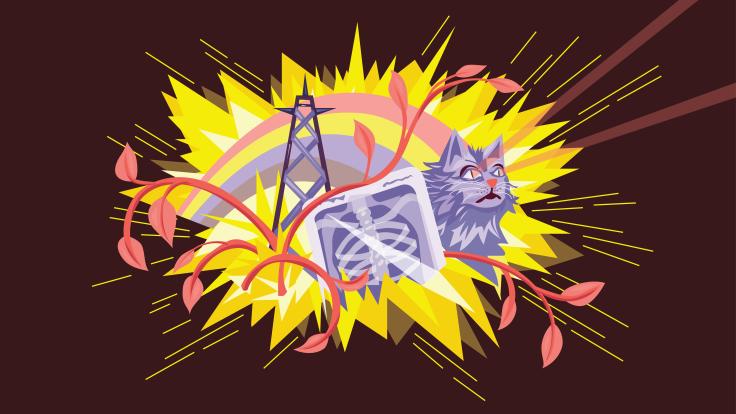
Passengers gather outside the ship that transported the particle detector -- and students -- to Antarctica. Photo courtesy of Kyle Jero.
When you’ve weathered four months aboard a ship that’s been through a storm so severe it knocks the cabinets off the walls, asking for money from your senator is no big deal.
So a trio of university students from Wisconsin weren’t nervous when they got the chance to join the April pilgrimage of undergraduate science students to Washington D.C.
Spring is an especially busy time on Capitol Hill. Before every election primary, members of Congress and would-be legislators campaign to be November’s nominee, expounding on their records of service and drumming up funds. And every April students descend on Washington with a zeal befitting stumping season. They aren’t looking for ballot votes, but they are rallying for a piece of the budget pie. Their message is clear: Undergraduate research is a great cause.
“We just laid it out for the legislators and said, ‘We’re living, breathing examples of why giving money to undergraduate research is beneficial not only to individuals, but to communities, states, our country even,’” said Samantha Jakel, now at University of Wisconsin-Madison.
Jakel, along with Drew Anderson and Kyle Jero of University of Wisconsin-River Falls, presented their research at the annual Washington, D.C., conference Posters on the Hill. Their science poster summarized their contribution to a neutrino detection collaboration called IceCube. The forum, sponsored by the Council on Undergraduate Research, gave 75 undergraduates from 50 different institutions the chance to discuss their research with legislators, thank them for their support and talk up the importance of sustained funding.

Pictured left to right: Scott Borg of the NSF Office of Polar Programs; students Samantha Jakel, Kyle Jero and Drew Anderson; and Bonnie H. Thompson, program manager of the Office of International Science and Engineering. Photo courtesy of Kyle Jero.
The Wisconsin crew had an array of anecdotes and lessons learned firsthand to back up their bid for money.
Symmetry magazine reported in October on the trio’s trip last winter from Sweden to Antarctica on a ship as they monitored the particle detector on board with them. Earth’s magnetic field gradually intensifies between the equator and poles, permitting only particles above a particular energy into the atmosphere based on geographic location. With this knowledge, the students collected data necessary to calibrate the low-energy range of the IceTop detector. This detector, currently being installed in the Antarctic ice, will help calibrate the larger IceCube detector.
The students and their advisor James Madsen, a professor of physics at UW-River Falls, met with Wisconsin’s legislators, including Sen. Russ Feingold and staffers from the offices of Sen. Herb Kohl and representatives Dave Obey and Paul Ryan. They also met with a riveted Rep. Ron Kind, who had to be dragged away from the students’ poster to submit a vote.
“Representative Kind actually talked to the students for quite a while,” Madsen said. “He’s been quite supportive of continued funding to double the NSF budget; that was really encouraging to see.” As for Sen. Feingold, he engages with the students, Madsen said. “He’ll ask, ‘What do you tell people is the reason you’re doing this research?’”
When the senator asked, the students had their answers ready.
“Physics isn’t about turning in assignments and taking tests,” Jero said. It’s about being able to do something on your own. It’s about learning how to ask the questions yourself instead of having questions asked of you.”

Kyle Jero during his weeks-long stint aboard the Oden icebreaker last winter as it travelled from Sweden to Antarctica, carrying a small particle detector. Photo courtesy of Kyle Jero.
Jakel’s stint on the ship showed her the value of undergraduate research.
“Before I started this, I didn’t think you could really work doing research and work with real data,” Jakel said. “My impression of the whole thing was that you had an internship; you learned stuff, but you didn’t really get to do anything hands-on.”
But participants at Posters on the Hill would like legislators to know that this isn’t and shouldn’t be the case.
“I think that’s the bottom line. These things have value beyond the individual experience, and there are multiplying effects as people hear about these things,” Madsen said. “While the legislators may be signing a bill that looks like a bunch of numbers, these are real experiences that happen.”
Learn more about the students’ project at http://www2.uwrf.edu/icecube/.






